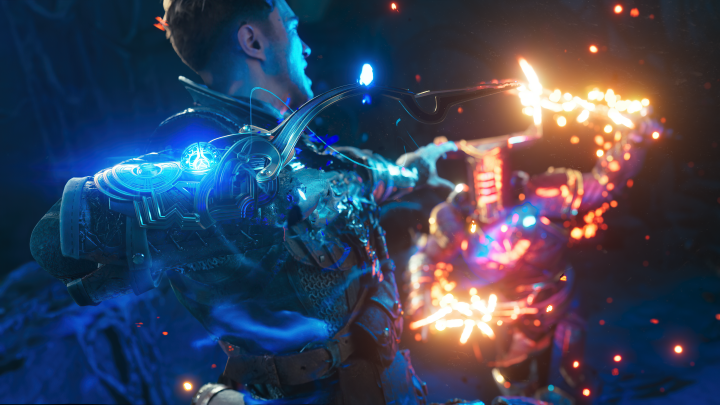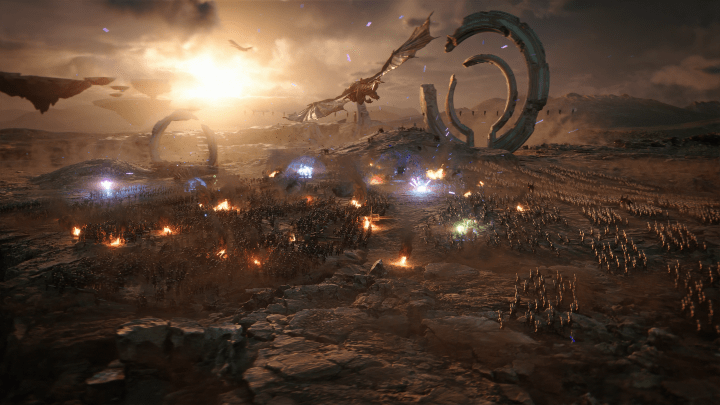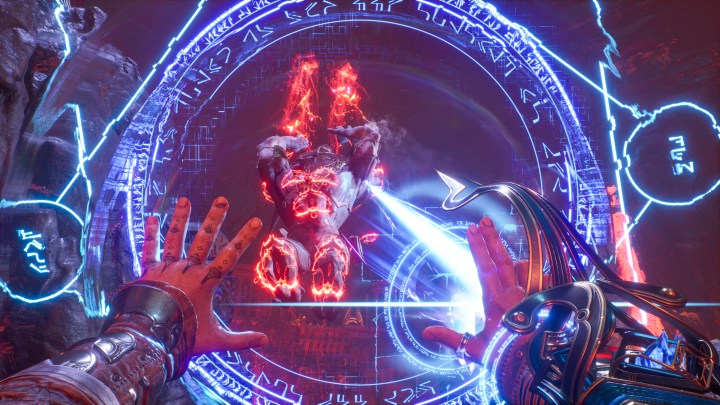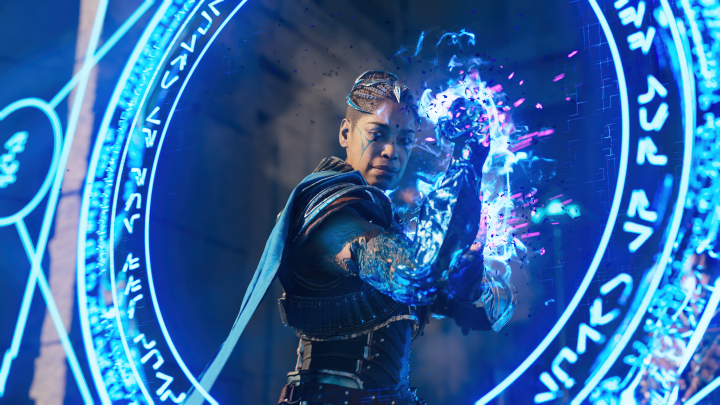When Ascendant Studios set out to make its debut game, Immortals of Aveum, it had a strong pitch on its hands. The idea was to create a “first-person magic shooter” that took some of the basic ideas of Call of Duty and mapped it into a fantasy setting. Guns would become spells, helicopters were replaced with dragons. In a presentation revealing the title’s first gameplay, the team would double down on its inventive approach, saying that it’s the kind of game we haven’t seen in years.
It was a little funny, then, when gameplay began rolling and a chat full of press members and influencers began drawing comparisons. Games like Ghostwire: Tokyo and Forspoken were invoked within a few minutes, underscoring an emerging trend in the 2020s gaming scene: magic is in. What was a fresh concept in 2018 will now launch into a crowded field dominated by financial behemoths like Hogwarts Legacy. Can Immortals of Aveum still stand out even if it’ll be 2023’s third biggest magic game by the time it releases?
Based on a hands-off look at the game, which is set to launch on July 20, there’s good reason to think it could. Immortals of Aveum leans into full spectacle for a visually dazzling fantasy that’s as intense as Call of Duty. It’ll just need to prove what’s so distinct about it if it wants to avoid an oncoming slew of comparisons.
War is magic
Prior to its new gameplay reveal, we’d barely gotten a glimpse of Immortals of Aveum. A teaser trailer at last year’s Game Awards would give a glimpse of its fantasy setting and massive scale, but details have been scarce since. We now know exactly what it is: a story-driven, single-player first-person shooter that replaces guns with spells. It’s a traditional action-adventure game (no microtransactions, no always-online component) that features combat, traversal, and puzzling.

The story takes place in the world of Aveum, a sprawling fantasy setting that has colorful ley lines running through it like veins. Those contain powerful magic, which has led to a tense Everwar between factions in the world. Its hero is Jak, a battlemage who awakens his magical potential after experiencing a trauma. He must use his newfound powers to stop the villainous Sandrakk. Whatever Sandrakk wants to do with the magic sounds bad, with one character calling it “some real end of time shit.”
The Call of Duty influence is clear off the bat, as Immortals of Aveum essentially tells a fantasy war story. Executive Producer Kevin Boyle provided some further context on the story in an interview with Digital Trends, explaining some of the ways its magical setting ties into a more human conflict. For Boyle, it’s a story about how an individual with power becomes a chess piece in a war.
“We start from a place where Jack is able to express a very small amount of magic and this traumatic event leading to something significant,” Boyle tells Digital Trends. “We get into the ways in which you appear on someone’s radar as something potentially dangerous or something potentially useful in the ongoing conflict of this world. You’ve gained the attention of important people by way of expressing this much magic. How you’re pulled into the broader conflict of the world is something, I think, is really interesting.”

What really sells the stakes of that conflict is Immortals‘ staggering production value. Some of the gameplay clips I saw were impressively cinematic in nature, with colorful spells firing around the screen like a fireworks show. The presentation’s climactic moment saw Jak being lifted off a battlefield by a massive dragon, forcing him to fight it off in first-person. It’s a seamless sequence that captures the excitement of a war game and the imaginative spectacle of fantasy.
It’s not Harry Potter
The real star of the show is Immortals of Aveum’s combat system, which is sure to draw a few comparisons. Jak has access to three different kinds of magic, each represented by a bright color. Blue magic acts as a basic long-range gun, red functions like a shotgun, and green shoots out homing darts. Using shooters like Call of Duty as a basis, Ascendant wanted to draw from familiar gun archetypes as a basis for the system. For Boyle, that idea ties back to some of its thematic ambitions too.
“There’s been this constant emphasis on how we direct this in a way that it’s more responsive and visceral,” Boyle says. “We’ve seen plenty of IP or fantasy content where magic is focused through an object like a wand, but what does that look like through a weapon of war? How do we take all these things that we find cool and steer them towards the conflict of this world?”

At first glance, the magic system shares some similarities with Ghostwire: Tokyo. It has the same “finger gun” feel and Jak can even summon a magical shield to block enemy attacks like Akito can. Combat looks much deeper here, though … and flashier too. The gameplay clips I saw almost looked like Doom, with Jak zipping around arena-like rooms at high speeds and flipping between spells on the fly. It’s a lot to take in — with flashes of blue, green, and red lighting up the battles like muzzle flashes and grenade explosions would in a military shooter — but it looks spectacular. Color plays a major role in combat too, as Jak needs to match his attacks to an enemy’s shield color like in Destiny 2 (Boyle notes that the team has considered potential accessibility hurdles there and paired colors with shapes to help players).
What I’ve described is only where the magic system starts, though. Jak gets an arsenal of spells that go beyond basic gun powers. The most intriguing of those is a blue lash that can drag enemies toward him. Naturally, that can be used to drop enemies off a cliff too. Another spell can slow enemies or objects to solve environmental puzzles. I’m not sure how deep it goes, but some of the clips I saw certainly had me trying to wrap my brain around how many spells I was seeing cast in a matterof seconds. The team notes that it wanted to capture the smooth, fluid nature of Call of Duty battles, and that certainly tracks so far.

In discussing the magic system during the presentation, one member of the team jokes “We’re not Harry Potter!” Thankfully, that’s true. Immortals of Aveum goes for something grander, imagining what a heavily militarized conflict would look like in a pure fantasy world. I’ve enjoyed the slice I’ve seen so far – I’m just not sure it’s as groundbreaking at this point as Ascendant seems to think it is. It’s still a fairly standard action game, drawing on a concept that’s frankly more popular than realistic military shooters are right now. It feels like something that’s going to continue an emerging trend more than break new ground. As long as it plays as good as it looks, though, I’m not complaining.
Immortals of Aveum launches on July 20 for PC, PlayStation 5, and Xbox Series X/S.



